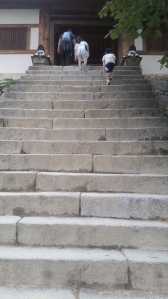I know it’s lazy of me to reuse the format I used in my last post, but it’s such an easy way to sum up moments from the week.
Monday
First Korean surprise in a long time. Today is supposed to be the first day of the speaking test for 1st & 2nd graders, as my co-teacher and I discussed and confirmed multiple times last week.
3 minutes before class, I happen to message my co-teacher to make sure she has the score sheets printed (because if she didn’t, I would print them).
2 minutes before class, she replies and says she’s moving the speaking test to next week because the students aren’t prepared.
Thankfully I have next week’s lessons pre-planned and ready to go, even at literally a minute’s notice. Proactive-ness to the rescue.
Tuesday
My 2nd graders are unusually cheerful for a Tuesday morning. For fun, I show them some optical illusions before we start the book. This is one of their favorites: Stare at the image below without moving your eyes. Try not to blink. See what happens.

(As you stare, the colors should fade and eventually disappear.)
After the first one or two students react, there’s an outcry of “What? What?? I can’t see it! What is it?” and then someone explains and there’s a renewed staring effort. The chorus of “Ooh! 와~~!” as one kid after another experiences the illusion is so fun.
Wednesday
My 1st period class pushes my patience to the limits. I’m helping two kids in front with the textbook dialogue and there’s a crash in the back. One of the boys has just “accidentally” fallen out of his chair, and this was far from his first disturbance. My co-teacher is in the hallway lecturing a handful of kids that she’s pulled out of class.
Seeing the look on my face, another boy raises both fists and says solemnly, “Teacher, fighting*.” More or less like this:

Source: dramafever
*As I’ve written about previously, the expression “fighting/화이팅” equates to “you can do it” / I know it’s hard but don’t give up.” I found it semi hilarious coming from a student in this situation. Like, “Teacher I know we are being little terrors but I believe in you.”
On the way home, I stop at the local mart and the cashier, who is usually pretty solemn and stone-faced, starts chatting with me in Korean. She asks if I’m from Russia. Erm, no. I tell her I’m American. Then she explains it’s my eyes that look Russian. That’s a new one, but her next question (“are you married?”) is definitely not. She gives me a thumbs up when I reply that I am not. Awkward questions aside, the unexpected friendliness brightens my day.
Thursday
It’s the first day of the last part of middle school for the 3rd graders, since they just finished final exams yesterday. I’m holding my breath in fear as I go into my first class with them, dreading an apathetic tooth-pulling experience, but they’re totally cheerful. We’re doing a belated Halloween lesson. They’re more engaged than they have been all semester. One of the low level kids who rarely speaks in class even remembered the name for candy corn from last year.
Later, a 3rd grader comes repentantly to my office to show me that while playing with his friends in the hallway, he somehow knocked off the “O” from the foam letters on the wall outside the classroom that spell “ENGLISH WORLD.”
“He break the world,” his classmate accused.
Friday
One of my 1st grade boys who’s usually pretty active in class has his head down on the desk. “What’s wrong?” I ask. “Are you sick? Headache? Or just tired?” (I always ask them this because if they’re sick I let them sleep – kids take way fewer sick days here than we would in the West and if they’re feeling miserable there’s no point in forcing them to study. They’re usually honest with me.)
The student pops his head an inch or two off the desk and says grimly, “I die.” Then he returns his head to the desk. (Translation: just tired. He perked up mighty quick when we started playing a game.)





















